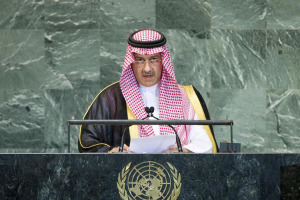
The arguments outlined in the official statement by Saudi Arabia’s Ministry of Foreign Affairs (UN inefficiency in resolving the Arab-Israeli conflict, settling the crisis in Syria and the inability to create a zone free of weapons of mass destruction in the Middle East), didn’t convince spectators, who immediately rushed to search for the true causes behind such an unprecedented and sharp reversal of Saudi diplomacy.
The commentator Abdel Bari Atwan, well-known throughout the Arabic internet, wrote then and there that the issue is Saudi Arabia’s dissatisfaction, first of all, with the United States, and to a lesser extent, with Russia. People in the Saudi capital were reportedly angered by Barack Obama’s failure to launch a military operation against Syria, which was considered a foregone conclusion, and which should have led to the overthrow of Bashar al-Assad (militants prepared by the Saudis were already concentrated around the walls of Damascus). They were then further angered when he gave Russia the credit for diplomatic victory. So in Riyadh, they decided to show their feelings.
The newspaper Al-Hayat, issued in London with Saudi money, having outlined the official Saudi arguments, made it clear, for its part, that the issue lay also in the US-Iranian rapprochement, which could undermine Saudi Arabia’s position as a key ally of the United States (after Israel) in the Middle East and the guarantor of its security. This version was repeated in different variations by nearly all of the main streams of regional and international media.
Moreover, a representative of the U.S. State Department, who was tormented by journalists searching for an assessment of this step by Riyadh, which was so incredibly rigid in its decisiveness, stoically kept silent and gave no comment. Indeed, American newspapers from October 20 began vying with one another, like mad dogs on the loose, to criticise their ally in the Persian Gulf for its actions.
In fact, there’s something to that. Whatever the motives of the Saudis, they dealt a harsh blow to virtually all those who spoke in favour of them, including the U.S. In other words, more than 150 countries supported the accession to the Security Council of a country, which, as it turns out, didn’t want it at all. The semi-official Saudi newspaper “Arab News”, issued in English, tried to make assurances in its October 21 edition that Riyadh’s demarche found widespread support throughout the world and that many share the “anti-UN” position of Saudi Arabia. In truth, on closer examination, this position was supported mainly by Saudi Arabia’s closest allies: Bahrain, Qatar, Turkey, while the rest “expressed understanding”, though with varying degrees of enthusiasm. Above all, these turned out to be the regional organisations experiencing firsthand the strong influence of the Saudi monarchy – the Gulf Cooperation Council, the Arab League, and the Organisation of Islamic Cooperation. Of the major extra-regional countries, this “understanding” was shown only by France, which has long flirted with the gulf monarchies in search of money, and is ready to support any of their positions in exchange for lucrative contracts.
Beyond the Middle East, bewilderment has reigned because of this unprecedented manoeuver undertaken by the Saudis. After all, from the point of view of most nations, if you are dissatisfied with the situation in the UN, and are then elected to its core body and work for yourself as you see fit, you change what you don’t like, you make reforms, and you achieve efficiency. Particularly as you are supported by the majority of countries in the world.
However, that’s not what happened. Some experts in the region believe that the Saudi demarche stems primarily from the fact that after the recent resounding failures in the attempts to “remove Assad from office”, by U.S. hands at that, Riyadh found itself in an unusual isolation surrounding the majority of its concerns. Active membership in the Security Council would only more clearly demonstrate this to the Saudis and force them to reveal their true positions, which they by no means plan to change: a forced change of regimes that are undesirable to them, the creation of a zone of like-minded Sunni states, and so on. Membership in the Security Council would tie their hands.
This policy has always been to the liking of their old friends in the U.S. – the Republicans, or rather, the most influential neo-conservatives (above all, the Bush family). They were the ones who undertook the demolition of the secular national regimes in the Middle East, starting with Iraq. But this policy has diverged from the opinion of the present occupant of the White House, who is now picking up the pieces of the results of their activities. Riyadh’s current demarche is therefore aiming at Barack Obama and his Middle East course. We cannot exclude the possibility that on some secret Saudi-Republican papers regarding this topic lies the stamp of the Bushes and the resolution “approved.”
Pogos Anastasov, political scientist and orientalist, exclusively for the online magazine “New Eastern Outlook”.
